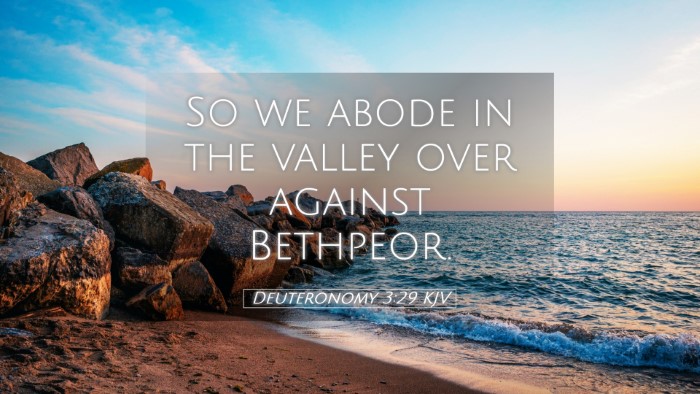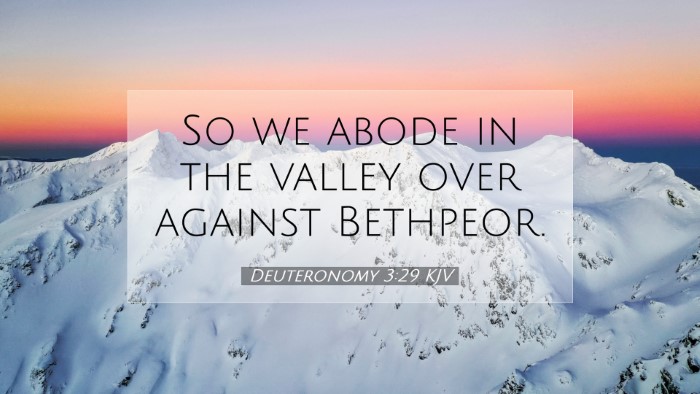Commentary on Deuteronomy 3:29
Verse Context: Deuteronomy 3:29 states, "But we stayed in the valley opposite Beth Peor." This verse reflects the culmination of the Israelites' journey as they approached the Promised Land. The significance of this moment is underscored by its placement in the wider narrative of Deuteronomy, where Moses addresses the Israelites, recounting their history and God's faithfulness.
Overview
This passage serves as a transition within Moses' address, summarizing the Israelites' experience and setting the stage for the detailed laws and exhortations that follow. It conveys a sense of reflection and anticipation, capturing both the solemnity of their past failures and the hope of future blessings.
Theological Reflections
- The Importance of Remembrance: Matthew Henry emphasizes the necessity of remembering God's past mercies and judgments as a means to encourage faithfulness in the present and future. Moses recalls the events leading to this moment to reinforce the spiritual lessons learned along the way.
- God's Sovereignty in Guidance: Adam Clarke notes that the mention of Beth Peor points to Israel's failures, particularly the idolatry associated with Baal Peor. This highlights God's sovereignty over Israel’s journey, noting how He leads His people even through moments of rebellion and sin.
- The Valley as a Symbol: The valley opposite Beth Peor serves as a metaphor for both humility and the consequences of sin. It reminds the Israelites that their journey was not only geographic but spiritual, filled with lessons on obedience and faith.
Historical Context
Recollection of Past Events: Albert Barnes provides an archaeological perspective, noting that the region surrounding Beth Peor was significant due to the battle against King Og of Bashan and the subsequent distribution of land. This recounting reinforces the historical narrative of God's protection and provision through times of struggle.
Covenant Responsibilities: The Israelites, on the verge of entering the Promised Land, stand at a pivotal moment in their covenant relationship with God. Clarke stresses that this moment not only serves as a remembrance of God's faithfulness but as a call to obedience as they prepare to inherit the land promised to their ancestors.
Lessons for Today
- Reflective Practice: Pastors and leaders are encouraged to remind congregations of their own spiritual journeys, reflecting on their struggles and triumphs. This practice fosters a culture of remembrance that resonates with the weight of the biblical narrative.
- Importance of Obedience: The cautionary tale of Beth Peor serves as a reminder of the consequences of disobedience. The call to faithfulness remains critical for contemporary believers, urging them to stay true to God’s commands as they navigate their own spiritual landscapes.
- All-Encompassing Grace: God's grace is evident even amidst failures. The acknowledgment of previous shortcomings should encourage believers to seek continual reconciliation with God, emphasizing His unchanging nature and the promise of redemption.
Conclusion
Deuteronomy 3:29 encapsulates a powerful moment of introspection for the Israelites as they prepare to transition into a new phase of life in the Promised Land. It invites readers, scholars, and clergy alike to consider their own spiritual journeys and the overarching themes of faith, remembrance, and obedience to God.


